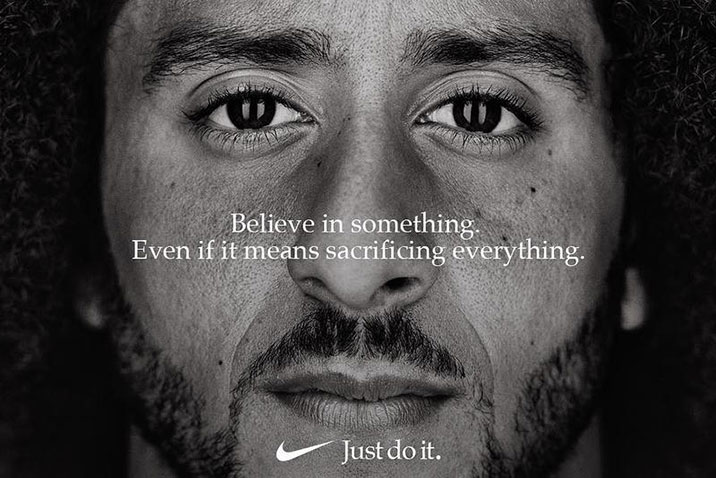As we explained earlier this year, more businesses are participating in the public discourse surrounding divisive social issues, undeterred by today’s hyper-partisan climate. While their impetus to do so varies, many companies are appealing to the interests of their customers and employees. For a company to do otherwise is to imperil its wellbeing, after all. That is why most businesses, before taking a public stand on an issue, invest in market research to approximate the reactions of key stakeholders.
Even by these emerging standards, however, Nike’s decision to make Colin Kaepernick the face of the 30th anniversary of its “Just Do It” campaign is arrestingly bold. Not only is Kaepernick a polarizing figure for taking a knee during the playing of the national anthem at NFL games to protest racial injustices, the former San Francisco 49er is suing the league—an important Nike partner.
The company’s move provoked an array of responses, ranging from predictable Hatfield/McCoy standoffs on social media to a modest selloff in Nike shares. In a Wednesday Tweet, veteran pollster Frank Lutz railed against the move: “What happens when the world’s most popular sports brand doesn’t do its research? It loses $4 billion. I am continually amazed when big brands that should know better still make colossal errors based on faulty judgment. I’m sure they will sell more stuff… But is it worth it?” Separately, a poll of U.S. consumers was released Thursday indicating that 24 percent of respondents now view the brand unfavorably, up from 7 percent.
It remains to be seen the extent to which Nike’s actions will be accretive to the company’s long-term success. Nevertheless, there is an apparent logic to Nike’s strategy that is instructive to stewards of both consumer and corporate brands.
Mine new markets – The new Just Do It Campaign is evidence that Nike is playing a long game that is aided by the revitalization of its brand. As Oppenheimer’s Brian Nagel observed, “the extensive roster of athletes and their powerful stories are core to the company’s stepped up efforts in reaching a younger demographic”—a market segment that, at least domestically, values social activism. Moreover, the company is targeting 12 priority markets in an online sales offensive, only two of which, New York and Los Angeles, are located in the U.S.
Tap one’s heritage – In ways that are scarcely recognizable to the diversified holding company that it is today, Nike was an upstart brand that represented a fresh alternative to Adidas, Puma and Converse. Just Do It wasn’t simply a departure from industry conventions, it constituted an in-your-face challenge to athletes and consumers alike to dig deep to be their best. The company’s willingness to take chances has occasionally backfired, including the cringe-worthy 2010 television commercial in which Tiger Woods was asked by his deceased father if he had “learned anything” in response to the golfer’s marital infidelities that dominated the headlines. For better or worse, Nike has been steadfastly daring.
Contemporize the brand – In 1995, Michael Jordan, a Nike pillar, reportedly quipped that “Republicans buy sneakers too” when asked why he didn’t weigh in on political and social issues. Even in the pre-social media days of yore, the world’s most famous athlete was criticized for playing it safe, which he acknowledged in a 2016 essay, “I Can No Longer Stay Silent.” And so it is that athletes and other popular culture figures today aren’t simply tolerated for expressing their views, they are expected to demonstrate them. Therefore, Nike casts Kaepernick as an embodiment of what it means to just do something, only now in ways that transcend sports.
Embrace the chaos – It’s not for nothing that Nike elected to launch the new Just Do It campaign with a Tweet by Kaepernick, willfully making a splash in the contentious end of the social media spectrum. The rollout strategy is notable not because the company initiated an important conversation—as if social media routinely enables measured discourse among parties who disagree—but because it substantiates Nike’s narrative that doing something that matters frequently entails pushback and, sometimes, the need to go it alone. It is also a calculated gamble that more online influencers would act as advocates than detractors, an outcome that benefits the campaign in ways that nether paid nor earned media can.
Nike hasn’t been pitch perfect in its efforts thus far. For example, Just Do It’s signature phrase—Believe in Something. Even if it means sacrificing everything.—would have greater impact had Kaepernick not been under contract with the company as an unemployed quarterback. Still, the campaign has the potential to significantly advance Nike’s overarching business strategy. And, no matter the increased emphasis on social issues, that remains the foremost utility of business communications. ![]()
